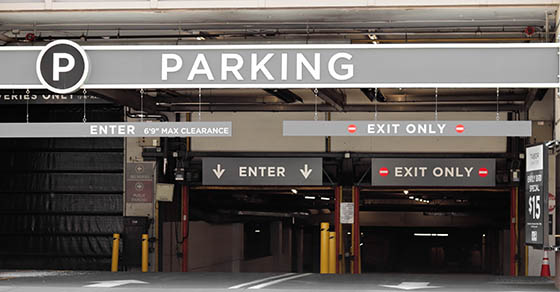Does your business provide parking as a fringe benefit for its employees? If so, in the event of an audit the IRS may want to know the details.
You should know the tax rules applicable to the arrangement.

Parking as a benefit
Employers are allowed to provide tax-free parking to employees as a qualified transportation fringe benefit under Internal Revenue Code Section 132(f). The dollar amount of qualified parking expenses that may be excluded from an employee’s gross income cannot exceed a statutory maximum, which is subject to annual cost-of-living adjustments. For 2022, the maximum is $280 per month.
The IRS webpage explains that the value of employer-provided parking must be determined following the same general rules as those used for valuing other fringe benefits under Treasury regulations. These rules provide that an employer must include in an employee’s gross income the amount by which the fair market value of the benefit exceeds the sum of the amount, if any, paid for the benefit by or on behalf of the recipient. Any amount specifically excluded under other applicable rules must also be documented.
The fair market value, which is determined based on all the facts and circumstances, is generally the amount that an individual would have to pay for parking at the same or a comparable site in an arm’s length transaction.
Tips for auditors
The IRS webpage also provides tips for its auditors, who could encounter qualified parking benefits as part of their examinations. Auditors are advised to:
- Determine whether the employer provides parking for any employees,
- Request a list of employees entitled to receive employer-provided parking,
- Determine whether the employer includes any portion of the benefit in employees’ wages,
- Request the method used to determine the value of the parking benefit, and
- Conduct a survey, if necessary, of nearby parking facilities to determine the fair market value of the benefit.
Valuation issues generally arise with respect to qualified parking only where it’s provided “in-kind” by the employer — in other words, where the employer provides parking at its own lot.
Thorough documentation
If your company provides a qualified parking benefit, be sure to thoroughly document how you determine the value of that benefit. You’ll need to produce the documentation if you get audited. We can help you prepare for and fulfill your obligations during an IRS audit, as well as assist you in choosing fringe benefits and keeping accurate records of those you provide, Contact your Rudler, PSC advisor for more information at 859-331-1717.
RUDLER, PSC CPAs and Business Advisors
This week's Rudler Review is presented by Jonathan Peul, Staff Accountant and Janna Fitzwater, CPA.
If you would like to discuss your particular situation, contact Jon or Janna at 859-331-1717.


As part of Rudler, PSC's commitment to true proactive client partnerships, we have encouraged our professionals to specialize in their areas of interest, providing clients with specialized knowledge and strategic relationships. Be sure to receive future Rudler Reviews for advice from our experts, sign up today !